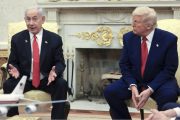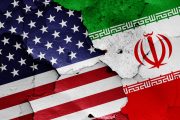
Adel Abdul Mahdi (shown), Iraq’s caretaker prime minister, told his parliament on January 5 that Iranian General Qasem Soleimani, who was killed in the U.S. targeted airstrike at Baghdad International Airport on January 3, was in Iraq to bring him Iran’s response to de-escalation proposals made in three-way talks between Tehran, Iraq, and Saudi Arabia.
Abdul Mahdi also said that President Trump had called him to ask for help in mediating with Iran after the U.S. embassy in Baghdad was attacked on December 31 by members of Kataib Hezbollah, an Iraqi Shia paramilitary group that is supported by Iran.
Abdul Mahdi told parliament that Trump thanked him for his efforts to quell the attack on the embassy, but he expressed disappointment that while the president appeared to be grateful, he was at the same time planning an attack on Soleimani.
Soon after their conversation, on January 3, Abdul Mahdi related, U.S. forces launched a drone strike that killed Soleimani. The attack also killed the Iranian-backed Iraqi militia leader, Abu Mahdi al-Muhandis.
As we noted yesterday, the Iraqi Parliament voted on January 5 to eliminate the U.S. troop presence in Iraq. Though the resolution did not mention the killing of Soleimani, parliament’s decision was obviously fueled by that strike.
Speaking aboard Air Force One, President Trump threatened sanctions against Iraq if U.S. troops were asked to leave on terms that he regarded as not “friendly”: “If they do ask us to leave, if we don’t do it in a very friendly basis, we will charge them sanctions like they’ve never seen before ever. It’ll make Iranian sanctions look somewhat tame.”
The Iraqi parliament’s resolution stated the reason for seeking the end of the U.S. presence is that ISIS has been defeated. “The government commits to revoke its request for assistance from the international coalition fighting Islamic State due to the end of military operations in Iraq and the achievement of victory,” it stated.
However, State Department spokeswoman Morgan Ortagus still regarded the defeat of ISIS as uncompleted, saying, “We believe it is in the shared interests of the United States and Iraq to continue fighting ISIS together.”
It is ironic that our State Department called for continuing the U.S. troop presence in Iraq to fight ISIS just after taking out Soleimani — since he was actively involved in fighting ISIS in recent years. He was a staunch supporter of the Syrian government of Bashar al-Assad and played a key role in Iran’s fight against ISIS in Iraq, where he led the Iranian-backed militia credited with pushing back the terrorist group. He has been described as the “linchpin” bringing together Kurdish and Shia forces to fight ISIS, overseeing joint operations conducted by the two groups.
Despite his past record opposing ISIS, the Defense Department said Soleimani was “actively developing plans to attack American diplomats and service members in Iraq and throughout the region,” giving this as the reason he was killed.
Photo: AP Images
Warren Mass has served The New American since its launch in 1985 in several capacities, including marketing, editing, and writing. Since retiring from the staff several years ago, he has been a regular contributor to the magazine. Warren writes from Texas and can be reached at [email protected].
Related articles:
Iraqi Parliament Votes to End U.S. Troop Presence in Iraq
Iraq Embassy Attack Illustrates Dangers of Continued Interventionism




